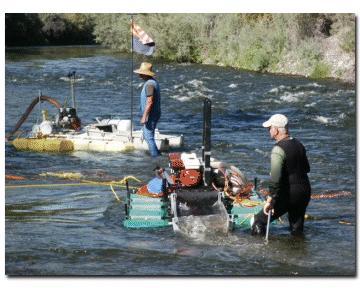
by Laura Zuckerman / Reuters
(Reuters) – Protesters gathered to illegally dredge for gold on Tuesday in an Idaho river where such mining is banned, in an open challenge to the U.S. government’s authority to regulate public waters and lands in Western states, an organizer said.
Six of nearly 60 miners at the rally were using portable pumps and hoses to collect gravel and sand from the streambed of a stretch of the federally protected Salmon River, which is closed to suction dredging and other mining by the U.S. Environmental Protection Agency to protect imperiled fish.
“It’s a matter of states’ rights,” Organizer John Crossman, head of the Southwest Idaho Mining Association in Boise, said in a telephone interview in which he described as overreach a recent rule by the EPA requiring permits to mine rivers in mostly Western states.
“This is the United States of America, not the ‘United State’ of America. The feds can’t come in here like storm troopers and start running our lands and rivers,” he added.
The demonstration marks the latest skirmish over federal oversight of public lands in the U.S. West that flared in April when supporters of a rebellious Nevada rancher squared off in an armed standoff with the U.S. Bureau of Land Management (BLM), which sought to seize cattle over his refusal to pay grazing fees.
That was followed by a protest in May by activists in Utah who rode all-terrain vehicles on a canyon trail to protest a closure by the BLM in part to protect Native American relics.
The week-long demonstration in Idaho by a group of self-styled constitutionalists will be capped on by an Independence Day rally in Riggins to denounce what Crossman termed “government tyranny.”
The miners at the protest near the town of Riggins said they hadn’t sought permits to suction dredge in the river, required under the federal Clean Water Act, because they don’t recognize the EPA’s regulatory powers.
The EPA said in a statement it respects the rights of citizens to peacefully protest on federal lands but added dredging the Salmon could harm habitat for species like Chinook salmon protected under the U.S. Endangered Species Act, and violating federal law.
(Editing by Cynthia Johnston; Editing by Sandra Maler)

